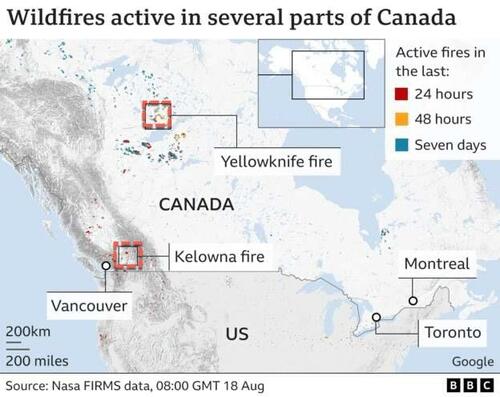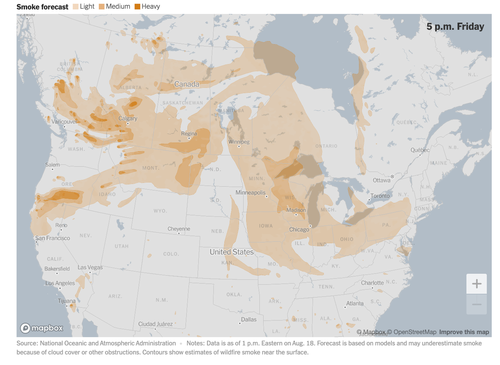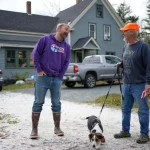
Residents in Yellowknife, the capital of Canada's Northwest Territories -- home to about 20,000, were forced to flee their homes as a wildfire is within ten miles of the city's northern edge. Another emergency order was posted for the 150,000 people that live in Kelowna, the largest city in British Columbia's Okanagan Valley.
BBC News reported Yellowknife's emergency evacuation is the fourth largest in Canada's history:
Some 20,000 people are currently making their way out of Yellowknife, fleeing a wildfire that is 16km (10 miles) away from city limits. Hundreds others have already made their way out earlier this week from towns in the South Slave region of the Northwest Territories.
Once the wildfire evacuation is complete, it could become the fourth largest in Canada's history, according to official public safety data.
The largest evacuation to date was in Fort McMurray, Alberta - a city that is now taking in some evacuees from the Northwest Territories - after its 90,000 residents were forced to flee from a wildfire in 2016.
Last night, in support of the Government of the Northwest Territories, an @RCAF_ARC CC-130J Hercules aircraft evacuated 79 long term-care residents from #Yellowknife to #Edmonton. More evacuation flights by the #CAF are planned in the coming days. #OpLENTUS pic.twitter.com/b0hnMQP6Fh
— Canadian Armed Forces Operations (@CFOperations) August 18, 2023
First-person camera footage shows the extent of wildfire smoke near Yellowknife, Canada, on Aug 17. Canadian authorities are trying to coordinate a mass evacuation of Yellowknife, home to 20,000 people, by road and by air this week, as historically large blazes encroach. pic.twitter.com/JbAQ16Uch2
— NowThis (@nowthisnews) August 18, 2023
ON QUE; THE NEXT PANDEMIC
— Real Frank (@realzitro) August 18, 2023
Western Canada fires spark new evacuations as firefighters race flames in Yellowknife pic.twitter.com/hrG3YOT5YG
Wildfires around Yellowknife in the Northwest Territories of Canada seen Wednesday.
— CIRA (@CIRA_CSU) August 18, 2023
These fires have caused evacuations for thousands of residents in the city and surrounding area. pic.twitter.com/GMEWMg8gXu
🇨🇦 | Western Canada fires spark new evacuations as firefighters race flames in Yellowknife.
— UHN English (@UHN_English) August 18, 2023
A massive wildfire in Canada's western province of British Columbia prompted more evacuation orders early on Friday, as firefighters race against advancing flames to move all residents… pic.twitter.com/meW6McBR5q
In British Columbia, a state of emergency was declared in Kelowna, home to 150,000 people. Bloomberg said the area is "on alert for possible evacuation."
Smoke fills the sky as the wildfire in Kelowna, British Columbia, grows. Thousands have been ordered to evacuate. #BCfire #BCWildfire pic.twitter.com/J0Y6C5AT0o
— AccuWeather (@accuweather) August 18, 2023
Kelowna last night.
— Alissa Thibault (@AlissaMThibault) August 18, 2023
Video from TikTok pic.twitter.com/eC8owNU1EX
BBC posted an active wildfire map showing fires that threaten Yellowknife and Kelowna.
"It is by far the worst forest fire season in our history... it is an incredibly difficult year," Canada's federal minister for environment and climate change, Steven Guilbeault, said.
Per the libertarian-conservative Canadian think tank, Fraser Institute, the wildfires across Canada this summer are not the result of 'climate change' but instead "bad forest policy":
Canada is having a hell of a fire season, there's no disputing that. And it's producing hellish landscapes across Canada and North America. What it is not, however, is a call to more of the same old "climate action." But rather, a call for more sane real-world real-time management of fire risk in Canada's forests, a practise that Canadian governments have failed at for decades.
One can only hope that this fire season will light a fire under Canada's fire-foolish policymakers, and finally motivate them to take the rational course—fighting fire risk with fire use, rather than pointing to the climate sky gods and calling for appeasement measures that will not affect Canada's risk of forest fires.
Meanwhile, terrible fire management policies from Canada is causing Americans to choke on smoke (again).
How do Americans hold Canada's fire-foolish policymakers accountable?
Residents in Yellowknife, the capital of Canada’s Northwest Territories — home to about 20,000, were forced to flee their homes as a wildfire is within ten miles of the city’s northern edge. Another emergency order was posted for the 150,000 people that live in Kelowna, the largest city in British Columbia’s Okanagan Valley.
BBC News reported Yellowknife’s emergency evacuation is the fourth largest in Canada’s history:
Some 20,000 people are currently making their way out of Yellowknife, fleeing a wildfire that is 16km (10 miles) away from city limits. Hundreds others have already made their way out earlier this week from towns in the South Slave region of the Northwest Territories.
Once the wildfire evacuation is complete, it could become the fourth largest in Canada’s history, according to official public safety data.
The largest evacuation to date was in Fort McMurray, Alberta – a city that is now taking in some evacuees from the Northwest Territories – after its 90,000 residents were forced to flee from a wildfire in 2016.
Last night, in support of the Government of the Northwest Territories, an @RCAF_ARC CC-130J Hercules aircraft evacuated 79 long term-care residents from #Yellowknife to #Edmonton. More evacuation flights by the #CAF are planned in the coming days. #OpLENTUS pic.twitter.com/b0hnMQP6Fh
— Canadian Armed Forces Operations (@CFOperations) August 18, 2023
First-person camera footage shows the extent of wildfire smoke near Yellowknife, Canada, on Aug 17. Canadian authorities are trying to coordinate a mass evacuation of Yellowknife, home to 20,000 people, by road and by air this week, as historically large blazes encroach. pic.twitter.com/JbAQ16Uch2
— NowThis (@nowthisnews) August 18, 2023
ON QUE; THE NEXT PANDEMIC
Western Canada fires spark new evacuations as firefighters race flames in Yellowknife pic.twitter.com/hrG3YOT5YG— Real Frank (@realzitro) August 18, 2023
Wildfires around Yellowknife in the Northwest Territories of Canada seen Wednesday.
These fires have caused evacuations for thousands of residents in the city and surrounding area. pic.twitter.com/GMEWMg8gXu
— CIRA (@CIRA_CSU) August 18, 2023
🇨🇦 | Western Canada fires spark new evacuations as firefighters race flames in Yellowknife.
A massive wildfire in Canada’s western province of British Columbia prompted more evacuation orders early on Friday, as firefighters race against advancing flames to move all residents… pic.twitter.com/meW6McBR5q
— UHN English (@UHN_English) August 18, 2023
In British Columbia, a state of emergency was declared in Kelowna, home to 150,000 people. Bloomberg said the area is “on alert for possible evacuation.”
Smoke fills the sky as the wildfire in Kelowna, British Columbia, grows. Thousands have been ordered to evacuate. #BCfire #BCWildfire pic.twitter.com/J0Y6C5AT0o
— AccuWeather (@accuweather) August 18, 2023
Kelowna last night.
Video from TikTok pic.twitter.com/eC8owNU1EX
— Alissa Thibault (@AlissaMThibault) August 18, 2023
BBC posted an active wildfire map showing fires that threaten Yellowknife and Kelowna.
“It is by far the worst forest fire season in our history… it is an incredibly difficult year,” Canada’s federal minister for environment and climate change, Steven Guilbeault, said.
Per the libertarian-conservative Canadian think tank, Fraser Institute, the wildfires across Canada this summer are not the result of ‘climate change’ but instead “bad forest policy”:
Canada is having a hell of a fire season, there’s no disputing that. And it’s producing hellish landscapes across Canada and North America. What it is not, however, is a call to more of the same old “climate action.” But rather, a call for more sane real-world real-time management of fire risk in Canada’s forests, a practise that Canadian governments have failed at for decades.
One can only hope that this fire season will light a fire under Canada’s fire-foolish policymakers, and finally motivate them to take the rational course—fighting fire risk with fire use, rather than pointing to the climate sky gods and calling for appeasement measures that will not affect Canada’s risk of forest fires.
Meanwhile, terrible fire management policies from Canada is causing Americans to choke on smoke (again).
How do Americans hold Canada’s fire-foolish policymakers accountable?
Loading…






